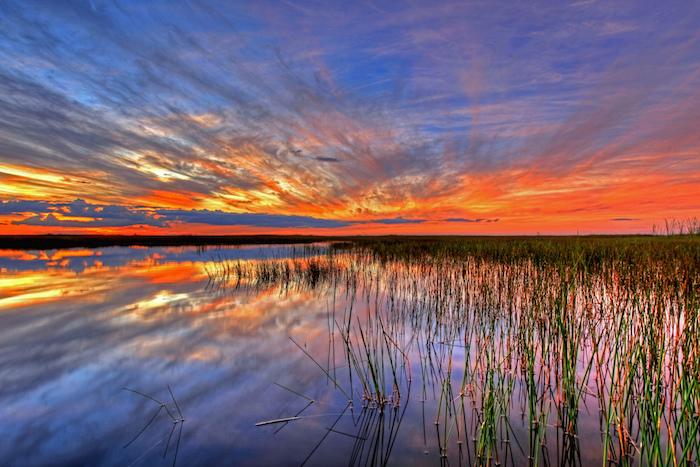
With the winter months here, Everglades' busy season is ramping up/NPS
While many parts of the country are hunkering down for snow season, at Everglades National Park in Florida they're ready for the busy season.
If the coming months follow typical patterns, the weather will get cooler, rain will subside, and the mosquitoes will decline. World-class fishing, boating, hiking, camping and wildlife viewing are all part of the experience of this winter destination.
Beginning November 17, the Long Pine Key and Flamingo Campgrounds will be fully staffed to welcome campers. Buttonwood Café at Flamingo is also open for the busy season, beginning November 15. Visitors should note that Thanksgiving is historically one of the busiest camping weekends of the year, so plan accordingly. Long Pine Key Campground is first come, first served; once it’s full the Flamingo Campground may have available sites.
“As we celebrate the National Park Service’s Centennial year and the balmy south Florida winter weather so many enjoy, we know our visitors will take home many memorable experiences of enjoying the broad range of programs and activities available throughout the park!” said Everglades Superintendent Pedro Ramos. “We are excited to be adding showers as a new amenity at the Long Pine Key Campground. These are an example of how money visitors spend at the entrance station is being used to improve the visitor experience through improved infrastructure in this park.”
Front Country Camping: There are two drive-in campgrounds accessible from the Homestead entrance of the park: Long Pine Key and Flamingo. Both accommodate tents and RV's with a limited number of group sites.
Campground Reservations:
Long Pine Key No reservations accepted for Long Pine Key; all sites are first come, first serve. (This campground is closed during the slower, summer/fall season.)
Flamingo November 20 – April 15, reservations are available for approximately half of the available sites and can be made online at http://www.recreation.gov/. Note that the other half of the sites are held to accommodate those without reservations, on a first-come, first-serve basis. If the online reservations are full and you’d like to confirm if one of these sites is available, you can call the Flamingo Fee Station at 239-695-0124.
Reservations for Flamingo can also be made by phone: between November 20 and March 1 call 1-877-444-6777; between March 2 and April 15 call 239-695-0124.
April 16 – November 19, the Flamingo Campground goes to a self-registration system where sites are allocated on a first-come, first-serve system on site.
The Long Pine Key Campground is located seven miles from the main park entrance. When fully opened, there are 108 drive-up sites for tents and recreational vehicles, and one group site. A picnic area is nearby, with fire grates and rest rooms. There is also a pond for fishing, an amphitheater for winter programs, and several hiking trails in the area.
The Flamingo Campground is located approximately 38 miles from the main park entrance at the southernmost tip of the Florida Peninsula on the shores of Florida Bay. There is a ranger-staffed visitor center nearby with educational displays and informational brochures to help plan your visit or issue backcountry permits, and to access several nearby hiking and canoeing trails. Other services include a public boat ramp, marina store, and Buttonwood Café. The Café is the park’s only restaurant with food and beverage service, and for this season has expanded their healthy menu items and moved to using locally sourced produce from Robert is Here.
Both campgrounds accommodate tents and RVs with a limited number of group sites. Front country camping fees are $20 ($10 per night for senior U.S. Citizen, 62 or over; or Access Pass holders (permanently disabled). Group sites (up to 15 people) are $30 per night. RV camping fees at the 41 sites in Flamingo’s T-Loop with electrical hookup are $30 per site or $15 per site for Senior and Access Pass holders.
Back Country Camping: A backcountry permit is required for all wilderness campsites and issued the day before or day of your trip. This permit is required for a number of ground sites, beach sites, and elevated camping platforms (chickees) available in various locations in the park. Most sites are accessible by canoe, kayak, or motorboat, though a few may be reached by hikers. Please click this link for more details on back country camping: http://www.nps.gov/ever/planyourvisit/backcamp.htm
For information and directions to the park please visit the park website at http://www.nps.gov/ever or call (305) 242-7700 (during regular business hours, Monday through Friday, 8 a.m. – 4:30 p.m.).



Comments
Who took that amazing photo. The Everglades is a national treasure.
An NPS staffer by the name of G. Gardner, Katy. It is gorgous.
Glenn Gardner is actually an NPS volunteer at Everglades -- and yes, an extraordinary photographer. -- Bob Krumenaker
Kudos to Glenn Gardner at www.g2photos.com. He has donated dozens of gorgeous photos to Everglades NP like this one used for the article! Everglades is so licky to have such an amazing volunteer who works to bring the Everglades and Dry Tortugas to life through his photography!